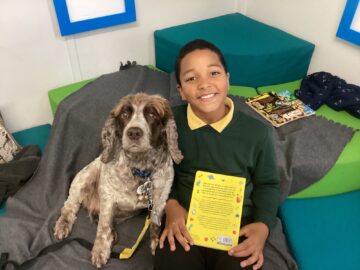Reading at Mere Green
At Mere Green, Reading is at the heart of our curriculum. Our aim is that every pupil will learn to read fluently and confidently, regardless of their background, needs or abilities, by the age of 7. We recognise that being able to read is the single biggest indicator of success in later life, (OECD, 2021). Our reading curriculum enables children to become proficient, fluent readers who develop an enjoyment and appreciation of books, giving them the confidence and skills to succeed and thrive in life.
Phonics and Early Reading
Our school phonics programme is Read Write Inc, which sets out a structured and systematic approach for children to become fluent readers by the end of KS1. The children are assessed regularly and grouped according to their ability, to allow complete participation in lessons. Any child which is not meeting expectations in their reading ability is swiftly supported through additional interventions, which are evaluated regularly.
In Read Write Inc, the children will:
- Learn 44 sounds and the corresponding letter/letter groups using simple prompts
- Learn to read words using sound blending (Fred talk)
- Read lively stories and non-fiction books featuring words they have learnt to sound out
- Show that they comprehend the stories by answering ‘Find It’ and ‘Prove It’ discussion questions
See the ‘Phonics’ section of our website for more information.
Teaching of Shared Reading
For children who have finished our phonics programme, we teach whole-class Shared Reading lessons. Within these lessons, children explore and discuss purposeful fiction and non-fiction texts. Teachers initially model reading aloud to the class, followed by children reading aloud. Each text is explored in depth to develop fluency, to unpick vocabulary and to develop a greater understanding of the content. Technology enhances the teaching and learning within Shared Reading: features and apps on the iPad allow all children to have accessibility to the same texts, scaffolding learning when required. These lessons teach the following reading domains:
In KS1, children who have finished the phonics programme will be taught the following skills:
- Draw on knowledge of vocabulary to understand texts
- Identify and explain key aspects of texts, such as characters, events, titles and information
- Be able to sequence events in texts
- Make inferences from the text (look for clues from which we can make an informed assumption)
- Predict what might happen on the basis of what has been read so far.
In KS2, children will be taught the following skills:
- Retrieve and record information
- Explain the meaning of words in context
- Identify and explain how meaning is enhanced through words and phrases
- Make inferences from the text, and justify these with evidence
- Summarise main ideas from more than one paragraph
- Predict what might happen from what has happened, or what is implied
- Explain how information is related and contributes to meaning
- Make comparisons within and across texts.
Progressive skill documents ensure that skills are built upon, along with on-going assessments and summative tests (NGRT) to track progress.
If a child is not making the expected progress in reading, they will initially be screened through our phonics assessment to ensure there are no phonetical gaps in their learning. Following this, they will be moved onto a fluency or comprehension reading intervention. Interventions are swift, robust and meaningful, with progress being tracked and evaluated closely.
Our Reading Spine
We have created a progressive Reading Spine at Mere Green of carefully selected books that children will read in each year group. This ensures that by the end of our pupils’ journey at Mere Green, they will have read a wealth of high-quality, diverse books. We offer an inspirational, ambitious Reading Spine including classic texts, texts to complement the curriculum and texts to develop children’s culture and understanding of inclusivity. Class books are read aloud daily by the class teacher. We continue to develop the use of supplementary texts throughout the wider curriculum to deepen subject knowledge and to continue to develop reading fluency.
In Early Years, we have a fortnightly story which stems from our Reading Spine. The provision is then based on the content of this book, including orally retelling the story, deepening understanding of sequencing and applying new vocabulary.
See the ‘EYFS’ section of the website for the EYFS Reading Spine.
Reading for Pleasure
Our aim is to create life-long readers at Mere Green and our home-reader offer supports this. From EYFS to Year 3, children are provided with home-reader books that closely match their reading ability. Whilst children are on our RWI phonics programme, they receive a weekly RWI Phonics Book Bag Book to correlate with their RWI coloured group. When the RWI programme is completed, we use the Oxford Reading Criterion Scale to assess children onto an Oxford Reading Tree book band. Children in Year 4 to 6 will also have a home-reader if they are working below age-related expectations.
All children across the school have a weekly library book and are encouraged to read regularly at home. We have two well-stocked school libraries ran by a host of school-librarians, which are a place of inspiration. They are used to promote a love of books, to explore authors and to develop children’s own reading interests. In addition to this, we utilise the Mere Green Public Library. We are lucky to have the Mere Green Library so close to our doorstep, where a class will visit to read stories each week.
We provide positive reading opportunities throughout the year for our children and families to engaged with, including phonic workshops and holding bi-annual books fairs. We also have a special weekly visitor: Snoopy the reading therapy dog, who engages a group of reluctant pupils whilst supporting their wellbeing through the charity Pets For Therapy.

